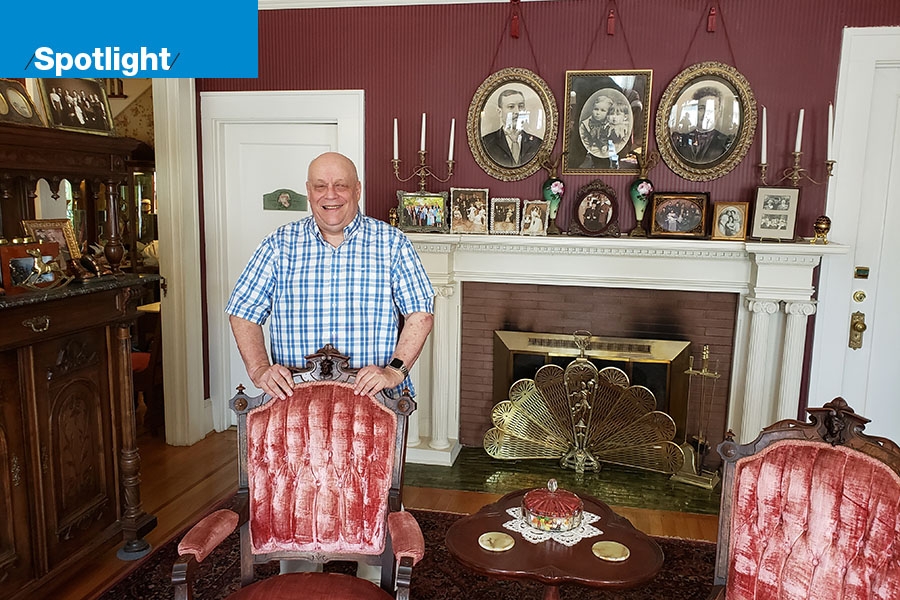How traditional bed-and-breakfasts survive in the era of Airbnb
It was a Victorian mansion in every sense of the word, from the delicate china to the velvety cushions to the vintage black-and-white photos of women in chokers and men with manicured mustaches.
It was like stepping into a long-forgotten era of hospitality, and soon it might be gone. A “For Sale” sign hangs in front of the Lion and the Rose Victorian Guest House in Northeast Portland.
The inn’s precarious state may seem confusing at first glance. There can be no denying the fact that Oregon is in the middle of a tourism boom. According to state tourism agency Travel Oregon, tourism spending has increased nearly 5% every year since 2011.
In 2018 tourism was a $12 billion industry in Oregon. Although occupancy is slightly down this year from last, that probably has more to do with the increase in the number of hotels.
Indeed, there are more hotels in Oregon than there have ever been, and more guest lodgings under construction every day. From the 33-story Ritz Carlton set to be built in downtown Portland to lodges and guest homes bubbling up in Bend and a luxury RV park coming to Coos Bay, one would be forgiven in thinking Oregon’s time-honored bed-and-breakfast tradition would be swept up in the rising tide.
Not so fast, says Steven Unger, innkeeper and co-owner of the Lion and the Rose.
Unger bought the inn 17 years ago with his husband, Dusty, and according to him, the rise of online short-term rental services, such as Airbnb and HomeAway.com, has offset the gains of the tourism boom.
Not only that, short-term rentals have become such a privileged competitor due to their lack of regulation and lower tax burden that they have made running a traditional bed-and-breakfast harder than ever before.
Unger can remember the first time that new technology transformed the bed-and-breakfast landscape.
When he and his husband began their careers as innkeepers, the industry was transitioning from guidebooks and travel agents to online reservations. Today the website is giving way to apps, making short-term rentals all the more poised to prevail.
“If you want to start a bed-and-breakfast today, you would have to be crazy to start it without Airbnb, the cost of entry is so low,” Unger says. His best advice for new innkeepers would be to buy the domain name for a business and have the address reroute to the Airbnb landing page, eschewing the traditional website altogether.
But it’s not technology that’s driven the Lion and the Rose to pack up the show. According to Unger, smaller short-term rentals from Airbnb, the ones that cost between $50 and $90 a night, aren’t competing for the same customer base as the traditional bed-and-breakfast would be.
The price point is just too low. That is to say, travelers who opt for more economical lodging options were probably never going to consider a traditional bed-and-breakfast anyway.
The reason short-term rentals are bad for business has everything to do with the increasing prevalence and under-regulation of what is known in the industry as “entire-place rentals,” where a guest can rent out the whole of a house or apartment without the owner present to supervise the property and the guests.
Facing fewer regulations or expenses than traditional bed-and-breakfast operations — which are subject to health inspections, more thorough taxation and registration fees — entire-place rentals can offer a comparable getaway at a lower price.
Unger says the deck is stacked against innkeepers whose records and operations are more transparent.

Francesca Amery, who owns Bayberry Inn in Ashland. Credit: Bayberry Inn
“When we started in Portland 17 years ago, there were 20 B&Bs that were licensed. Five of them were in big mansions and 15 were in little houses,” he says. “Today there are only two left of the mansions, [The Lion and the Rose] and Portland’s White House. Some of the others still operate, but mostly everything else is [short-term rental].”
While multiple cities, including Portland, have begun taking steps to tax and regulate short-term rentals, including a 2019 provision that would prevent Airbnb from collecting booking fees on unpermitted rentals, the playing field is far from level.
Bed-and-breakfasts still have many more hoops, both regulatory and financial, to jump through than short-term rentals.
In addition to transient occupancy tax, lodging tax and business taxes, bed-and-breakfasts must also conform to health and fire code inspections — all of which are difficult to enforce on short-term rentals.
Airbnb responded by stating it collects and remits hotel taxes in more than 30 jurisdictions in Oregon, and says it has been working hard to make listing bed-and-breakfasts easier.
Last year the short-term rental company saw a 152% increase in the number of rooms available on Airbnb in properties that hosts categorized as boutique hotels, bed-and-breakfasts, and other hospitality venues such as hostels and resorts. The company added it has added tools and features to help hosts grow their businesses.
For Claudia Toutain-Dorbec, who owns the Cannon Beach Hotel, a historic bed-and-breakfast on the Oregon Coast, Airbnb attacks traditional bed-and-breakfasts from multiple angles.
“Would I say Airbnb has affected my bottom line? The answer is definitively ‘Yes.’ I have sunk millions of dollars into my business. I have health inspections. Things need to be cleaned in a certain way, and for that I need staff,” Toutain-Dorbec says, echoing the fact that short-term rentals do not have to undergo the same level of scrutiny.
While her homemade breakfasts of quiche and casseroles are certainly a draw, it makes her property, like all other bed-and-breakfasts, a food establishment.
The hot pillowy eggs, sizzling pancakes and drizzles of syrup are often the most alluring part of the bed-and-breakfast, but issues of catering and licensing intensify the regulatory burden.
Toutain-Dorbec also says the rise of short-term rentals has led to an increase in property values in the area, as so many homeowners are able to supplement their income with short-term rentals. “Staff can’t afford to live out here, the property values are so high,” says Toutain-Dorbec.
“There have been times I’ve had one person working three different locations in one day.”
As much as Airbnb and other short-term rentals create competition, online travel agencies form another trapping for innkeepers in the digital age. The dominance of online travel agencies, such as Expedia and Booking.com, has added one more fee to an inn’s already tight budget.
“Would I say Airbnb has affected my bottom line? The answer is definitely ‘Yes'” Claudia Toutain-Dorbec
“Given the prevalence of [online travel agencies] when someone searches for your bed-and-breakfast, an Expedia and Booking page with your inn’s name is always the first result,” says one innkeeper who chose to remain anonymous.
Online travel agencies can cost an innkeeper between 15% and 20% of each booking fee, squeezing an innkeeper’s already thin profit margin. According to Trip Advisor, 86% of travelers use online resources when deciding on accommodations; so for many innkeepers, not registering with these agencies isn’t an option.
Short-term rentals that go through an established website can breeze past this problem, and large hotels can absorb the cost with ease.
Not so much bed-and-breakfasts, which operate on an average gross income of $20,000 a year, according to travel advice website TripSavvy.
Portland’s White House bed-and-breakfast, for its part, has weathered the storm of entire-place rentals and online travel agencies. For general manager Paula Bloemendaal, the trick to keeping a bed-and-breakfast afloat has to do with providing services short-term rentals cannot.
“I would say 80% of our revenue is in bookings and the other 20% is in events,” she says. Bloemendaal contends that most challenges come less from short-term rentals and online travel agencies, and more from the upswell of hotels in the Portland metro area.
To compete, the bed-and-breakfast offers options unavailable at larger luxury venues. “We offer elopement wedding packages for about 10 guests. We’ve already had five this year. More and more couples would rather spend their money on their honeymoon or buying their first house.”
Portland’s White House has chosen to double down on the things B&Bs can offer that short-term rentals cannot. The inn offers a fully catered gourmet breakfast, something Bloemendaal believes to be a quintessential way of differentiating the business from a short-term rental.
For other bed-and-breakfast owners, keeping their home as a luxury lodging is only one step of the plan.
Josh and Miriam Bolton own C’est La Vie Inn, a bed-and-breakfast in the Eugene area. The couple owned a number of rental properties and were seeking to consolidate. For them, owning the inn itself has appreciating value.
“We expect the value of the property to increase since there aren’t a lot of Victorian houses around here anymore. Most have been torn down,” says Josh. While he believes the inn is sustainable as a bed-and-breakfast, he says other opportunities could arise to sell the property. “We’ve seen [several] B&Bs in the area close because they were purchased by families looking to turn them back into family houses.”
Pepper McColgan, proprietor of Belle Pepper’s Bed & Breakfast in Joseph, Eastern Oregon, says she hasn’t seen a whole lot of competition from Airbnb. “It’s really hard to say it’s had any impact on our revenues,” she says. “I think they’re two different experiences.”
Still, she’s heard about the advantages short-term rentals have over traditional bed-and-breakfast operations, and has a wary attitude to the industry. “In the B&B community, we have something called friendly competition.
If I can’t provide a traveler something they want, I’m happy to refer them to one of the other establishments in the community.” It’s a trend she says doesn’t exist in the Airbnb community.
As Oregon’s tourism industry expands and more tourism dollars flow into the state, having bed-and-breakfasts does a lot more than just offer a place to sleep and a bite to eat. The bed-and-breakfast, according to some innkeepers, has as much to do with ensuring guests get the most out of their visit.
“I get people to be repeat visitors,” says Francesca Amery, who owns Bayberry Inn in Ashland. Amery provides her guests with services that have a personal touch, such as dinner reservations, discount packages to Oregon Shakespeare Festival and recommendations for outdoor activities.
Amery says her job is as much about connecting visitors with Ashland as it is providing lodging.
“There’s a place for Airbnb,” she says, adding that she hopes her business and short-term rentals can coexist peacefully. “But they can’t replace what we offer. We get people to come back.”
And, of course, you can’t beat the breakfast at a B&B.
UPDATE: This article has been updated to include a response from Airbnb. (10/8/19)
To subscribe to Oregon Business, click here.






